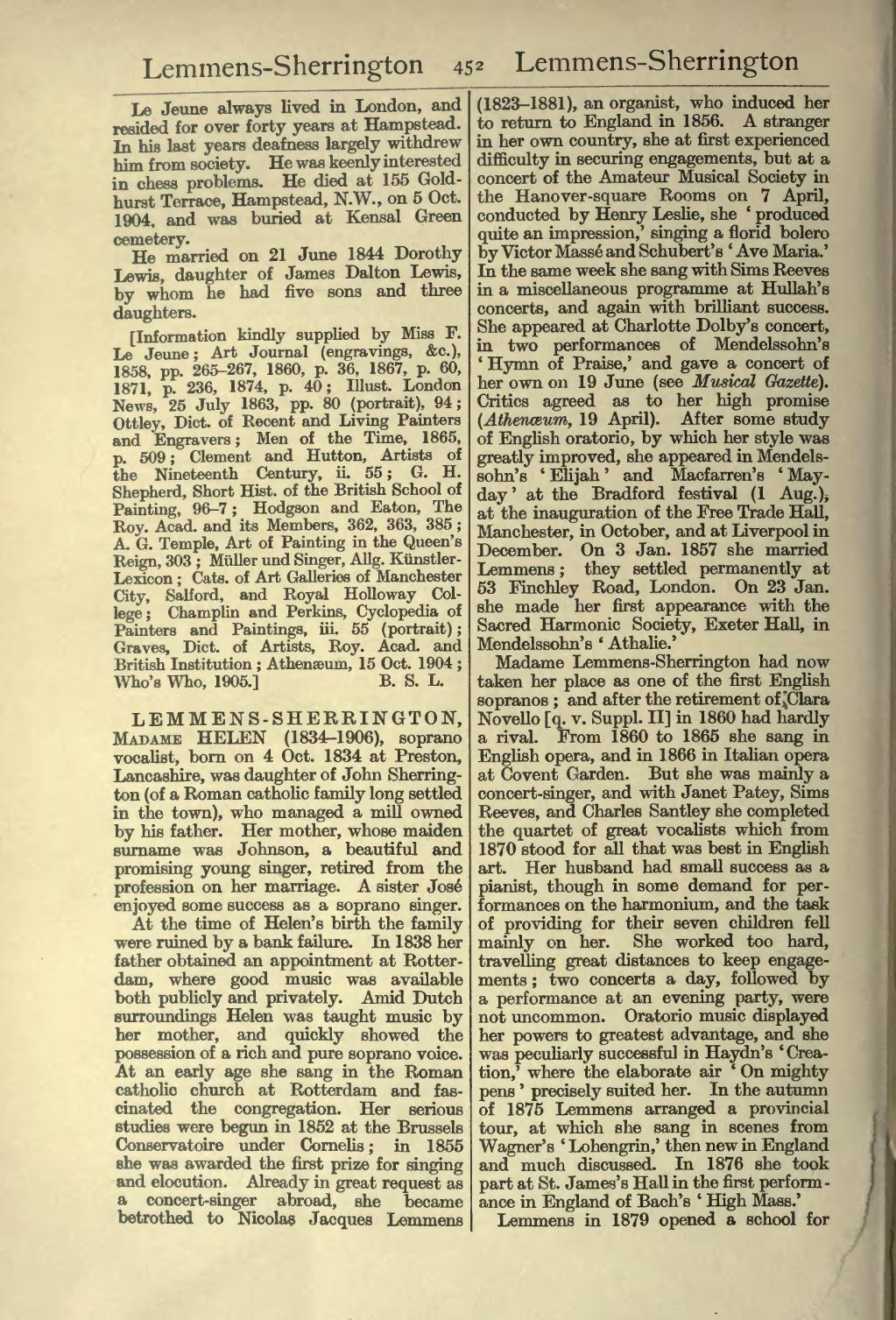Le Jeune always lived in London, and resided for over forty years at Hampstead. In his last years deafness largely withdrew him from society. He was keenly interested in chess problems. He died at 155 Goldhurst Terrace, Hampstead, N.W., on 5 Oct. 1904. and was buried at Kensal Green cemetery.
He married on 21 June 1844 Dorothy Lewis, daughter of James Dalton Lewis, by whom he had five sons and three daughters.
[Information kindly supplied by Miss F. Le Jeune; Art Journal (engravings, &c.), 1858, pp. 265-267, 1860, p. 36, 1867, p. 60, 1871, p. 236, 1874, p. 40; Illust. London News, 25 July 1863, pp. 80 (portrait), 94; Ottley, Dict. of Recent and Living Painters and Engravers; Men of the Time, 1865, p. 509; Clement and Hutton, Artists of the Nineteenth Century, ii. 55; G. H. Shepherd, Short Hist. of the British School of Painting, 96-7; Hodgson and Eaton, The Roy. Acad. and its Members, 362, 363, 385; A. G. Temple, Art of Painting in the Queen's Reign, 303; Müller und Singer, Allg. Künstler-Lexicon; Cats, of Art Galleries of Manchester City, Salford, and Royal Holloway College; Champlin and Perkins, Cyclopedia of Painters and Paintings, iii. 55 (portrait); Graves, Dict. of Artists, Roy. Acad, and British Institution; Athenæum, 15 Oct. 1904; Who's Who, 1905.]
LEMMENS-SHERRINGTON, Madame HELEN (1834–1906), soprano vocalist, born on 4 Oct. 1834 at Preston, Lancashire, was daughter of John Sherrington (of a Roman catholic family long settled in the town), who managed a mill owned by his father. Her mother, whose maiden surname was Johnson, a beautiful and promising young singer, retired from the profession on her marriage. A sister José enjoyed some success as a soprano singer.
At the time of Helen's birth the family were ruined by a bank failure. In 1838 her father obtained an appointment at Rotterdam, where good music was available both publicly and privately. Amid Dutch surroundings Helen was taught music by her mother, and quickly showed the possession of a rich and pure soprano voice. At an early age she sang in the Roman catholic church at Rotterdam and fascinated the congregation. Her serious studies were begun in 1852 at the Brussels Conservatoire under Cornelis; in 1855 she was awarded the first prize for singing and elocution. Already in great request as a concert-singer abroad, she became betrothed to Nicolas Jacques Lemmens (1823-1881), an organist, who induced her to return to England in 1856. A stranger in her own country, she at first experienced difficulty in securing engagements, but at a concert of the Amateur Musical Society in the Hanover-square Rooms on 7 April, conducted by Henry Leshe, she 'produced quite an impression,' singing a florid bolero by Victor Masse and Schubert's 'Ave Maria.' In the same week she sang with Sims Reeves in a miscellaneous programme at Hullah's concerts, and again with brilliant success. She appeared at Charlotte Dolby's concert, in two performances of Mendelssohn's 'Hymn of Praise,' and gave a concert of her own on 19 June (see Musical Oazette). Critics agreed as to her high promise (Athenæum, 19 April). After some study of English oratorio, by which her style was greatly improved, she appeared in Mendelssohn's 'Elijah' and Macfarren's 'Mayday' at the Bradford festival (1 Aug.), at the inauguration of the Free Trade Hall, Manchester, in October, and at Liverpool in December. On 3 Jan. 1857 she married Lemmens; they settled permanently at 53 Finchley Road, London. On 23 Jan. she made her first appearance with the Sacred Harmonic Society, Exeter Hall, in Mendelssohn's 'Athalie.'
Madame Lemmens-Sherrington had now taken her place as one of the first English sopranos; and after the retirement of Clara Novello [q. v. Suppl. II] in 1860 had hardly a rival. From 1860 to 1865 she sang in English opera, and in 1866 in Italian opera at Covent Garden. But she was mainly a concert-singer, and with Janet Patey, Sims Reeves, and Charles Santley she completed the quartet of great vocalists which from 1870 stood for all that was best in English art. Her husband had small success as a pianist, though in some demand for performances on the harmonium, and the task of providing for their seven children fell mainly on her. She worked too hard, travelling great distances to keep engagements; two concerts a day, followed by a performance at an evening party, were not uncommon. Oratorio music displayed her powers to greatest advantage, and she was peculiarly successful in Haydn's 'Creation,' where the elaborate air 'On mighty pens' precisely suited her. In the autumn of 1875 Lemmens arranged a provincial tour, at which she sang in scenes from Wagner's 'Lohengrin,' then new in England and much discussed. In 1876 she took part at St. James's Hall in the first performance in England of Bach's 'High Mass.'
Lemmens in 1879 opened a school for

